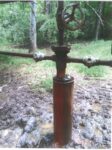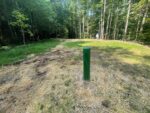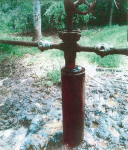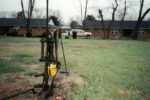- Like
- Digg
- Del
- Tumblr
- VKontakte
- Buffer
- Love This
- Odnoklassniki
- Meneame
- Blogger
- Amazon
- Yahoo Mail
- Gmail
- AOL
- Newsvine
- HackerNews
- Evernote
- MySpace
- Mail.ru
- Viadeo
- Line
- Comments
- Yummly
- SMS
- Viber
- Telegram
- Subscribe
- Skype
- Facebook Messenger
- Kakao
- LiveJournal
- Yammer
- Edgar
- Fintel
- Mix
- Instapaper
- Copy Link
Happy New Year from WV-SORO! Although Winter Storm Jonas is now behind us, the WV Legislature is continuing its work in Charleston through March 13. Please keep reading to learn more about what we’ve been up to and issues that are coming up during the 2016 legislative session.
Action Needed: Tell Your Legislators to Oppose SB 383, Implement Study Recommendations
Your legislators can only be effective representatives if they hear from folks back home. They need to hear from YOU about the need to implement the recommendations of the Horizontal Well Act studies to help surface owners. These recommendations include measuring the minimum distance well work could be from homes from the “limit of disturbance” (edge of the well pad), rather than the center of the well pad. A bill implementing the recommendations of these studies would also set measurable limits or standards for noise, light, dust and other air pollution from horizontal drilling sites and require fence-line monitoring for these things.
WV-SORO might support the forced pooling bill that is being drawn up in based on input from us and other “stakeholders” – IF we also get the additional surface owner protections that the Horizontal Well Act studies show are needed. WV-SORO has been in favor of “good” forced pooling legislation because it would to some degree decrease the number of well pads and other surface disturbance (and because it would help get the gas out of the ground more efficiently by preventing over drilling and by preventing waste of isolated “stranded” acreage).
- Click here to see what has to be in a pooling bill for it to be a good pooling bill.
- Click here to who is hurt and who is helped by a good forced pooling bill.
The“stakeholders” pooling bill has not yet been introduced. However, a really bad forced pooling bill, SB 383, has been introduced at the request of EQT. SB 383 would allow tracts to be pooled into units without surface or mineral owner agreement. The bill says, “The operator’s use of any surface tract overlying the jointly developed leases shall be permissible for that joint development.” So a surface owner’s small tract could be used for one of those monster pad for horizontal drilling into hundreds of surrounding acres of minerals – read literally, even if there was a “no surface use” lease.
Please contact your legislators and tell them to oppose SB 383. Tell them:
“I am against SB 383. I am for a bill that implements the recommendations of the studies the Legislature required DEP to do as part of the Horizontal Well Act. These studies, conducted for DEP by researchers at WVU, show that surface owners need more protections from noise, light, dust and other air pollution from horizontal drilling sites. We need more protective setbacks from our homes, and the ‘fence-line monitoring those studies suggested. It’s past time to implement these recommendations.”
Click here to contact your legislators.
Thank you for taking action. We’ll continue to keep you updated throughout the legislative session.
Rules Matter to Protect Our Health, Land, Air, and Water
Last August, WV-SORO) was one of several organizations that filed a legal notice with the U.S. Environmental Protection Agency (EPA) demanding regulations to stop oil and gas companies from dumping drilling and fracking waste in a manner that threatens public health and the environment.
WV SORO joined the Environmental Integrity Project (EIP), the Natural Resources Defense Council (NRDC), Earthworks, Responsible Drilling Alliance (PA), San Juan Citizens Alliance (CO), and the Center for Health, Environment and Justice in filing the notice, calling on the EPA to comply with its long-overdue obligations to update waste disposal rules that should have been revised more than a quarter century ago.
We were notified by our attorneys in December that they had not been contacted by the EPA in response to our notice and that they were moving forward with filing a formal complaint. At that point, the agency could offer to start settlement discussions and provide information regarding their plans to update its regulations for oil and gas wastes. However, for now, the suit is moving forward and we are asking a federal court to order the EPA to finally make the revisions it determined were necessary back in 1988 with regard to these rules.
The groups notified the EPA that they will file a lawsuit in 60 days unless the agency complies with its duty under the Resource Conservation and Recovery Act (RCRA) to review and revise the federal regulations governing how oil and gas waste must be handled and disposed. RCRA requires that EPA review the regulations at least every three years and, if necessary, revise them. The agency determined that such revisions of the regulations were necessary to address specific concerns with oil and gas wastes more than 25 years ago, yet has failed to meet its legal responsibility to act. If EPA does not act within 60 days of today’s notice letter, the groups intend to ask a federal court to set strict deadlines for EPA to complete this long-needed update and strengthening of its regulations for oil and gas wastes.
Although the EPA has failed to fulfil its duty to review and revise federal regulations governing how oil and gas waste is handled and disposed of, we’re pleased to report that the agency has proposed new rules to to curb methane and other harmful air pollution from oil and gas development. In September, Dave McMahon testified at a public hearing in Pittsburgh on behalf of WV SORO and the West Virginia Environmental Council (WVEC) in support of the rules. We also co-signed a letter submitted by more than 125 organizations around the country asking that the rules be strengthened to ensure that they are sufficiently strong to protect public health and tackle climate change.
Among the improvements we asked for in the rule was a provision to include affected communities in the pollution-detection process. A citizen complaint system is needed to allow communities living near oil and gas facilities to alert the EPA if they detect odors or air pollution events nearby. We also urged the EPA to regulate existing sources of methane pollution under the Clean Air Act to safeguard communities living with the burden of existing oil and gas development and to meet President Obama’s Climate Action Plan goal of reducing oil and gas methane emissions.
In addition to these rules, WV-SORO collaborated with our allies on several occasions last year to submit detailed, technical comments on a number of rules proposed by the WV Department of Environmental Protection (DEP), including revised rules governing horizontal drilling, aboveground storage tanks, and water quality standards. In particular, the revisions to the horizontal well rule proposed a number of improvements.
The most significant changes had to do with the use of pits for storing drilling waste. In its draft the DEP Office of Oil and Gas (OOG) proposed eliminating the use of pits associated with a specific well work permit and mandating the use of closed loop systems. Centralized pits subject to more stringent design and construction standards and operational criteria could still be used to store wastewater off-site for use.
In our comments we commended the OOG for proposing additional safeguards for centralized pits that store waste generated by natural gas drilling operations and the steps taken in this rule to reduce the use of pits and the problems associated with them. We also urged the agency to to eliminate the use of pits for the storage of drilling and hydraulic fracturing fluids and other drilling waste. Unfortunately, OOG accepted the industry’s argument that the Horizontal Well Act contemplated the use of pits and backed down on the closed loop mandate.
When the rule was taken up by the Legislative Rule-Making Review Committee in November, WV-SORO addressed this specific issue and highlighted the troublesome findings from a pit and impoundment study mandated by the Act to make the case for the closed-loop system requirement. In response to our presentation, Delegate Barbara Fleischauer offered an amendment to restore the closed-loop provisions. The amendment was not adopted but the committee’s co-chair, Delegate Kelli Sobonya, left us an opening to bring the issue back up when the rule considered during the 2016 legislative session, which we intend to do.
Besides restoring the closed-loop provisions to the horizontal well rule, WV-SORO’s other legislative priorities for 2016 include implementing the recommendations of the studies mandated by the Horizontal Well Act with regard to noise, dust, and other air emissions from horizontal drilling sites; ensuring that important provisions to protect surface owners remain in the “stakeholders” forced pooling legislation IF it advances; and giving surface owners a chance to own any interest in the minerals under their land when these mineral rights are sold for unpaid taxes.
Stay tuned for more information on these issues and visit www.wvsoro.org for updates.










